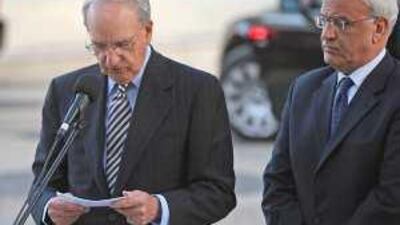RAMALLAH // Mahmoud Abbas, the Palestinian president, yesterday dismissed talk of a state with temporary borders, an idea that has been bandied about in the Israeli media in recent days, and urged the US to impose a solution on the parties. In a televised speech to leaders in his Fatah movement, Mr Abbas also warned again that time was running out for a two-state solution.
"Do you want a two-state solution?" Mr Abbas asked of Israel in the speech. "If you want it we are ready. We are still clinging to that option." Mr Abbas, who received George Mitchell, the US Middle East envoy, at his headquarters in Ramallah on Friday, rejected the idea of a state with temporary borders. The idea had been floated in the Israeli media as a way for the Israeli government to grant Palestinians an achievement without bowing to pressure to end settlement construction in occupied territory, especially East Jerusalem.
Mr Abbas said Palestinians were being asked to "take a state with provisional borders on 40 or 50 per cent, and after that we will see. Frankly, we will not accept the state with temporary borders." Establishing temporary borders has been suggested as an interim step before full independence, with the final boundaries being negotiated later. But the Palestinians have previously rejected the idea because they fear the temporary borders would become final.
The Fatah leader was addressing the 130-member Fatah Revolutionary Council at the first policy-drafting meeting since internal elections last August. Delegates plan to discuss negotiations with Israel, unity with Hamas, and prisoners in Israeli jails. They are also due to formulate a position on non-violent resistance. In his speech to delegates, Mr Abbas repeated his insistence that settlement construction in East Jerusalem must stop before he would agree to talks with Israel.
Mr Mitchell yet again failed on Friday to convince Mr Abbas to agree to start indirect negotiations through US mediation with Benjamin Netanyahu, the Israeli prime minister. Mr Mitchell is understood to have brought what one Palestinian official described as "concessions on non-substantial issues" from Mr Netanyahu. These were not spelt out, according to the official, though Israeli media reports suggest Israel is considering so-called confidence-building measures that might include the release of some 1,000 Palestinian prisoners and an easing of movement restrictions in the West Bank.
Mr Netanyahu had in recent days dug his heels in further over settlement construction in East Jerusalem. The many proposals for confidence-building measures and other sweeteners must be seen in the light of an ongoing negotiation between Israel and Washington over US pressure on Israel to end settlement construction. But the Palestinians are also not budging from their position on the issue. "There was no proposal of substance from the Israeli government," a Palestinian official said on condition of anonymity. He was referring to the settlement issue on which, he said, the Palestinians remain firm: "Mr Mitchell brought nothing new, and what he brought was not acceptable."
In his speech in Bethlehem, Mr Abbas called on Barack Obama, the US president, to impose a solution in the absence of negotiations, another proposal that has been floated in recent days as a way out of deadlock. "Mr President and members of the American administration, since you believe in this [an independent Palestinian state], it is your duty to take steps toward a solution and to impose this solution," Mr Abbas said.
Last week, the idea that the US would impose a solution on the two parties was floated in Washington, though US officials have since distanced themselves from the idea. On Friday, Hillary Clinton, the US secretary of state, distanced Washington from the idea of a Palestinian state with temporary borders. "So there's a lot of ideas that have been floated around, but at the end of the day it's only the Israelis and Palestinians who can make decisions for themselves," Ms Clinton said.
Mr Mitchell is due to meet Mr Netanyahu again today, but the US state department was keen to play down expectations for the visit. "Are we expecting a breakthrough result of this visit? Probably not," said Philip Crowley, a spokesman. In Gaza, meanwhile, Fawzi Barhoum, a Hamas spokesman, derided Mr Mitchell's visit as "useless" and warned Mr Abbas to resist US pressure to resume negotiations in light of what he called Washington's "retreat" in the face of Israeli intransigence over settlement construction.
"We say that a return to negotiations is a new conspiracy against the Palestinian rights and constants," Mr Barhoum said. okarmi@thenational.ae

